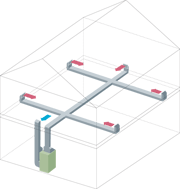
Forced-air HVAC equipment operates within fairly tight tolerances, and reducing its capacity can cause problems.
The most common problem associated with closing off too many air vents is that the ductwork starts to leak. The added air pressure in the ducts forces them apart and if you don't discover the leaks, your energy bills will escalate and the indoor air quality will decline. If you use any vented gas appliances, you also put yourself at risk for carbon monoxide exposure, since leaks can back-draft combustion gases into your home.
Another issue associated with closing vents or registers is that the blower could continue to run even after your home has been heated or cooled sufficiently. These systems have high limit switches that keep the blower fan running until it senses that the temperatures inside the blower have returned to normal. This increases your electric bill.
Closing air vents can be equally hard on your home's interior, as well, and hazardous if you close a room that has any plumbing pipes running through it. In cold weather, it's possible for the pipes to freeze and break. Your flooring can be damaged, as well as wood furniture and window frames.
It's possible to close or partially close some vents that are far from the indoor blower that don't pose such a risk to the HVAC system, but it's risky to close too many of those, because the air pressure inside the ducts will increase throughout the entire duct network. The best way to cut energy bills is to have your HVAC system professionally maintained at least once a year and change the air filters when they're dirty.
Contact the experts at Rodenhiser Plumbing, Heating & Air Conditioning for advice about closing air vents and avoiding creating too much air pressure inside your ducts. We've proudly provided HVAC services for the Route 495/128 area of Massachusetts since 1928.
Image via Shutterstock.com